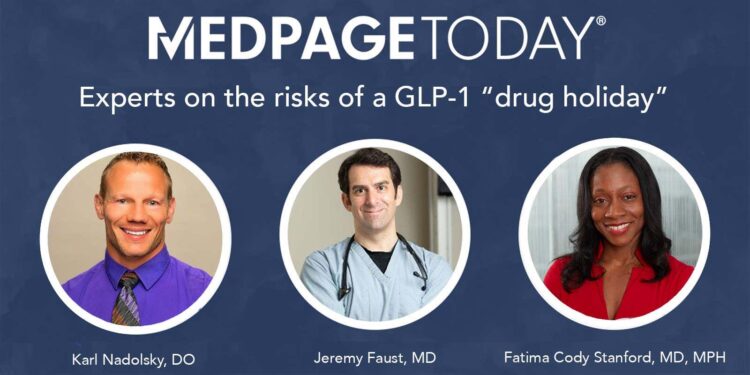In part three of this three-part Instagram Live discussion, MedPage Today editor-in-chief Jeremy Faust, MD, Karl Nadolsky, DO, and Fatima Cody Stanford, MD, MPH, MPA, MBA, explore the concept of GLP-1 drug holidays, the challenges of maintaining cardiometabolic benefits, and the evolving landscape of obesity care.
Nadolsky is a clinical endocrinologist and obesity specialist at Holland Hospital in Michigan. Stanford is an associate professor of medicine and pediatrics at Massachusetts General Hospital and Harvard Medical School in Boston.
Click here to watch part one and part two.
Following is a partial transcript of the video (note that errors are possible):
Faust: I do want to jump onto one more topic. And it’s something that we brought up last time, which is dosing tweaks, dosing adjustments. And I wrote something — what I call a little taboo — about drug holidays.
I know that there are… what is it, a third or more regain the weight? But I’ll set it up like this: I think of these medications as taking people off of the 10th rung of a ladder where if they fall, they’re going to hurt themselves, and that’s their cardiovascular risk. And then they lose the weight. They lose the weight. And along with that comes the metabolic benefits of that. And now they weigh a lot less. That’s lovely. But really what matters is their coronary arteries are better, that their heart failure is better, that their A1c and diabetes is better. And so now they may weigh less and they’re on the third rung. So if they have an event, it’s not as bad. And then maybe they stop it and they gain a little bit of weight back, but which rung are they on in terms of risk?
And so I wonder, is there a universe — the two of you — in which drug holidays after 2 or 3 years can happen? Or maybe a transition to a once-monthly or an oral? The idea of it’s a disease, we’re going to be on it for life. I get it, I get that. But I also have patients who used to be on metformin and now they’re not. So you can have… it can be a disease, but it doesn’t mean you’re consigned for life. So open the field on that question.
Stanford: I want to jump in immediately right here because we have data on this, right? We have data. So Wilding published a study, Aronne published a study, specifically looking at this answer to this exact question: What happens when you withdraw the patients from these medications? But the reality is that a large percentage of them will regain weight. I didn’t say 100%. A large percentage will. The question is who is who? We don’t know the answer to that question, but the fact that a large percentage will. And it’s not just the weight regain, it’s what you specifically stated. What will happen to those cardiometabolic benefits that you gleaned from these medications? They will start to reemerge.
And this is what exactly happens when I have those patients that were on medications prior to them switching to Medicare. They were doing so great, they were living their best life. We saw improvement in their lipid profile. We saw improvement in their liver function tests. We saw improvements in their hemoglobin A1c, everything was great. And then they have to switch to Medicare and they have to come off their meds because Medicare no longer covers. And all of those issues that were doing so great start to reemerge as they start to regain their weight. And all of those benefits that we had start to, for the most part, reemerge. Not with every single patient, but with let’s say about 80-85%.
So 80-85%, let’s just say will start to have those issues reemerge as they start to, unfortunately, rebound with their weight gain. So are you in that 80-85% that unfortunately will have those issues reemerge? Are you that 15% that doesn’t have those issues reemerge? Do we know which one you are? The answer is I can’t guess. There’s no magical, I guess, ball that I can look at and decide who you are.
Nadolsky: I think this needs to be studied more because I think that’s exactly right.
So you have to take each individual in their own personal circumstance. And if we want to do this, I always tell people that these are what the data say, just like she said. That’s what the biology of obesity does. And if you have type 2 diabetes and all these cardiometabolic diseases, we have to be even more vigilant of the recurrence or the exacerbation of those when you get off of them. If you have type 2 diabetes and this is what’s gotten you to all your cardiometabolic goals to reduce your risk, you probably aren’t going to come off of it necessarily. You know what I mean?
But also I tell people, well, we can work hard and see, but what I don’t want people to do is kick the can down the road and show up, regained all their weight back, and now they do have type 2 diabetes. If they were… let’s say they had pre-diabetes before. So I think if we’re going to do that, and I am all about whatever people want to do, but we got to do it right and we have to have close follow up because if they start to regain the weight… also, we didn’t talk about the symptoms of hunger cravings, food noise, lack of satiety. Some people are miserable when they get off of them too.
And then also I think something we all have to maybe do some more observational published data on stuff is the people who have switched to Medicare because that’s a thing, right? Or their insurances stop covering it. We’re going to have to start considering maybe some of the more cost-effective first-generation med alternatives to see, well, what could help people maintain the weight?
We know exercise volume, nutritional habits, all these things that help that have been shown forever for weight maintenance are important no matter what we do. And then who is going to require some medicine? Which medicines? Can they maintain on them or do we have to find a way for, probably a decent amount of them, to be on some version of these for chronic use? And you did mention they’re in the pipeline, there’s some really cool things coming out. Maybe there will be more cost-effective, similar medications, whether it’s monthly or oral or whatever for maintenance and hopefully cost-effectiveness continues to improve and get these covered for people who do need it long-term.
For more, watch the video above.
Source link : https://www.medpagetoday.com/opinion/faustfiles/113254
Author :
Publish date : 2024-12-08 15:00:00
Copyright for syndicated content belongs to the linked Source.














